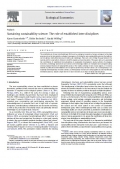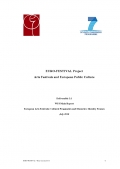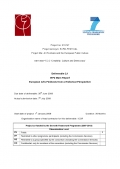Uploaded by Ivan Montenegro Perini 5333 days ago Number of pages: 7 File's language: English Views: 1649
The research aims at providing new knowledge on the causes, processes, and perspectives for change related to social and political exclusion of unemployed youth. It provides an integrated approach to the study of unemployment effects on youth exclusion from social and political spheres.
The research has three main components: a multidimensional theoretical framework integrating different explanatory factors; a comparative design including countries with different institutional approaches to unemployment; an integrated methodological approach based on multiple sources and methods.
The findings show that precarious and unemployed youth have very different political opportunities, depending on the country they live in. In all countries, civil society organizations support the integration of young unemployed and precarious workers.
Unemployment and precariousness should be dealt with at all levels (international, national, regional), including all relevant stakeholders (policy-makers, practitioners, unemployed) and taking into account all related issues (unemployment benefits, social aid, labor market regulations, child care, education, etc.)
 Youth, Unemployment, and Exclusion in Europe: A Multidimensional Approach to Understanding the Conditions and Prospects for Social and Political Integration of Young Unemployed
Youth, Unemployment, and Exclusion in Europe: A Multidimensional Approach to Understanding the Conditions and Prospects for Social and Political Integration of Young Unemployed Climate change, hydro-conflicts and human security: Achievements of and Gaps in current policies
Climate change, hydro-conflicts and human security: Achievements of and Gaps in current policies Sustaining sustainability science: The role of established inter-disciplines
Sustaining sustainability science: The role of established inter-disciplines European Arts Festivals: Cultural Pragmatics and Discursive Identity Frames
European Arts Festivals: Cultural Pragmatics and Discursive Identity Frames European Arts Festivals from a Historical Perspective
European Arts Festivals from a Historical Perspective European Public Culture and Aesthetic Cosmopolitanism
European Public Culture and Aesthetic Cosmopolitanism
iKNOW has been featured in the media and several research projects:
DIE ZEIT (Germany), Financial Times (Germany), El Heraldo (Colombia), Prospective Foresight Network (France), Nationalencyklopedin (Sweden), EFP - European Foresight Platform (EC), EULAKS - European Union & Latin America Knowledge Society (EC), CfWI - Centre for Workforce Intellience (UK), INFU - Innovation Futures (EC), Towards A Future Internet (EC), dstl - Defence S&T Laboratory (UK), EFSA - European Food Safety Agency (EU), Malaysia Foresight Programme (Malaysia), Bulletins Electroniques more...
